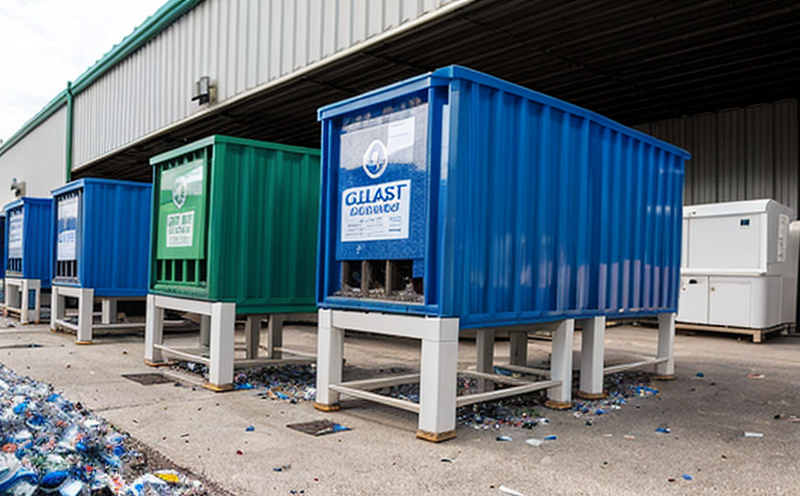ISO 12823 Contaminants in Recycled Glass Batches
The ISO 12823 standard provides a comprehensive framework to identify and quantify contaminants present in recycled glass batches. This service is critical for the waste management and recycling sector, ensuring that recycled materials meet quality standards suitable for remanufacturing into new products.
Recycling glass not only conserves natural resources but also reduces landfill waste and energy consumption associated with raw glass production. However, it's essential to monitor contaminants in these batches to prevent their transfer into end products, which could impact product quality or safety. ISO 12823 outlines specific methods for detecting trace elements, heavy metals, and other impurities that can compromise the integrity of recycled glass.
The test protocol involves several steps: sample collection, preparation, analysis using instrumental techniques like Inductively Coupled Plasma Mass Spectrometry (ICP-MS) or Flame Atomic Absorption Spectroscopy (FAAS), and interpretation based on predefined thresholds. The results help manufacturers understand the source of contaminants and take corrective actions if necessary.
Understanding the contaminants in recycled glass is vital for compliance with environmental regulations across various sectors, including construction materials, food packaging, and consumer goods. By adhering to ISO 12823 standards, companies can ensure their products meet stringent quality and safety requirements. This service supports ongoing research and development efforts aimed at improving recycling processes and reducing waste.
Regular testing of recycled glass batches helps businesses maintain a competitive edge by ensuring consistent product quality and reliability. It also enhances customer trust through transparent reporting on material purity and adherence to international standards. For companies involved in the circular economy, this service plays a pivotal role in promoting sustainable practices and reducing environmental impact.
The ISO 12823 standard is widely recognized for its rigorous approach to identifying contaminants in recycled glass batches. Compliance with these guidelines ensures that products derived from recycled materials are safe, reliable, and of high quality. This service supports industries ranging from construction to consumer goods, providing valuable insights into the composition of recycled materials.
By leveraging ISO 12823 testing, organizations can make informed decisions about their supply chains, ensuring only clean and uncontaminated glass is used in manufacturing processes. This not only enhances product performance but also contributes positively to environmental sustainability goals.
Frequently Asked Questions
Why Choose This Test
Comprehensive detection of contaminants including trace elements, heavy metals, and other impurities.
Supports compliance with international standards such as ISO 12823.
Ensures consistent product quality and reliability.
Enhances customer trust through transparent reporting on material purity.
The ISO 12823 test is essential for maintaining the integrity of recycled glass batches, ensuring that they meet stringent quality and safety requirements. By choosing this service, organizations can demonstrate their commitment to environmental sustainability while meeting regulatory obligations and enhancing product performance.
Quality and Reliability Assurance
The ISO 12823 test protocol is designed to provide accurate and reliable results through rigorous sample preparation and advanced analytical techniques. This ensures that the identification of contaminants in recycled glass batches is both precise and consistent across multiple tests.
Our laboratory adheres strictly to ISO 12823 guidelines, ensuring that every batch undergoes thorough examination using state-of-the-art instrumentation. The results generated are detailed and comprehensive, providing valuable insights into material composition and potential sources of contamination. This information is crucial for making informed decisions about supply chain management and process optimization.
By leveraging the ISO 12823 standard, businesses can ensure that their recycled glass batches meet strict quality standards, thereby maintaining product performance and reliability. The test results also support ongoing research and development efforts aimed at improving recycling processes and reducing environmental impact.
Customer Impact and Satisfaction
Enhanced product quality through precise contamination detection.
Increased customer trust due to transparent reporting on material purity.
Sustained compliance with international standards such as ISO 12823.
The ISO 12823 test has a direct impact on customers by ensuring that recycled glass batches are free from harmful contaminants. This supports the production of high-quality products that meet stringent safety and performance requirements. Transparent reporting on material purity builds trust with clients, fostering long-term relationships based on reliability and integrity.
Compliance with international standards like ISO 12823 is crucial for maintaining a competitive edge in the global market. By adhering to these guidelines, businesses can ensure that their products are safe, reliable, and of high quality. This enhances customer satisfaction and loyalty, ultimately driving business growth and success.





